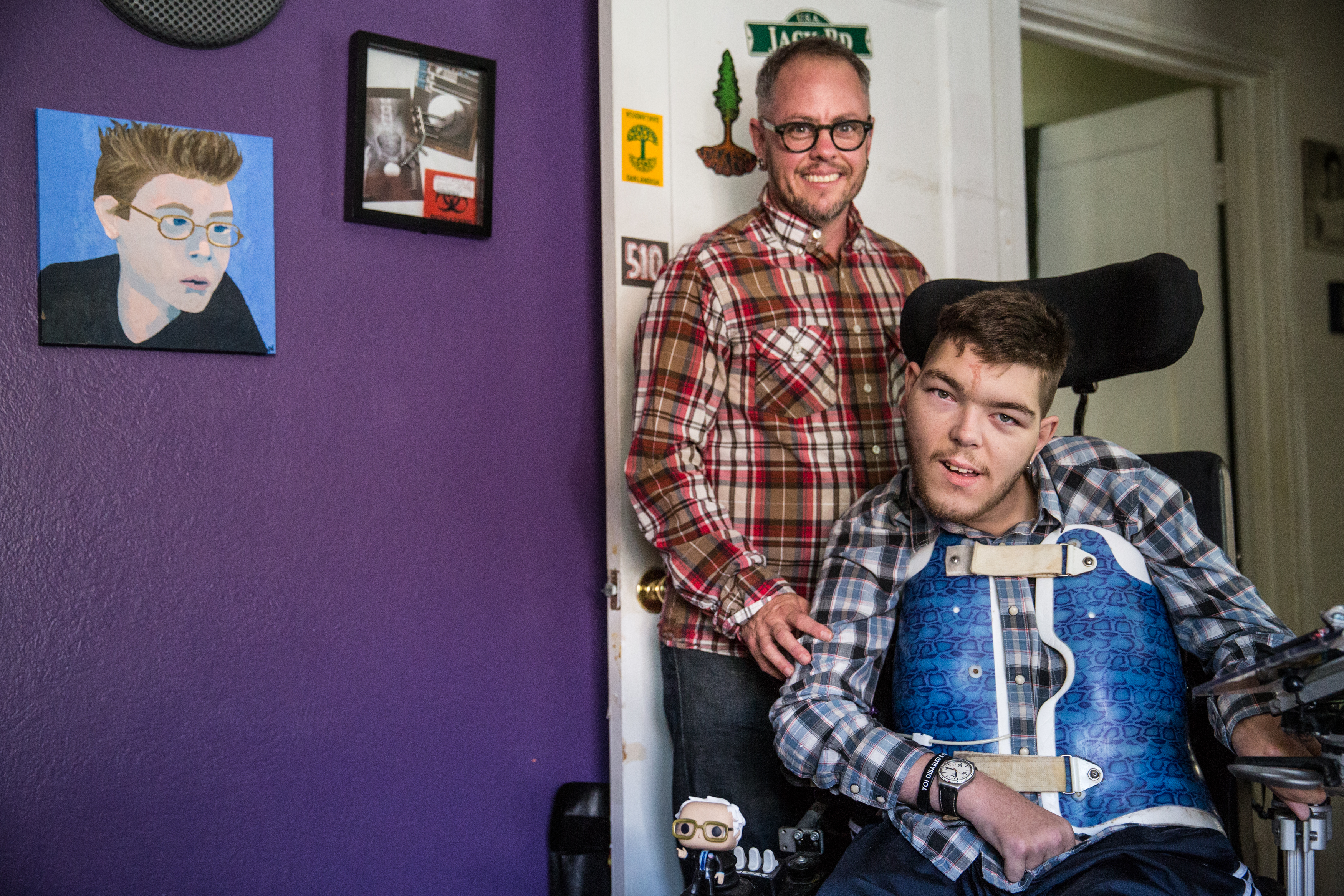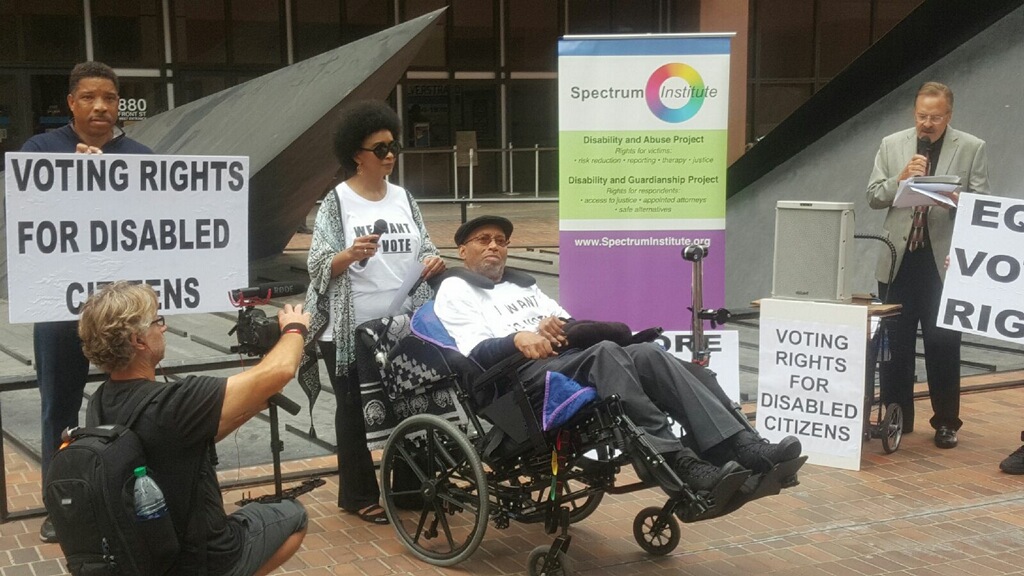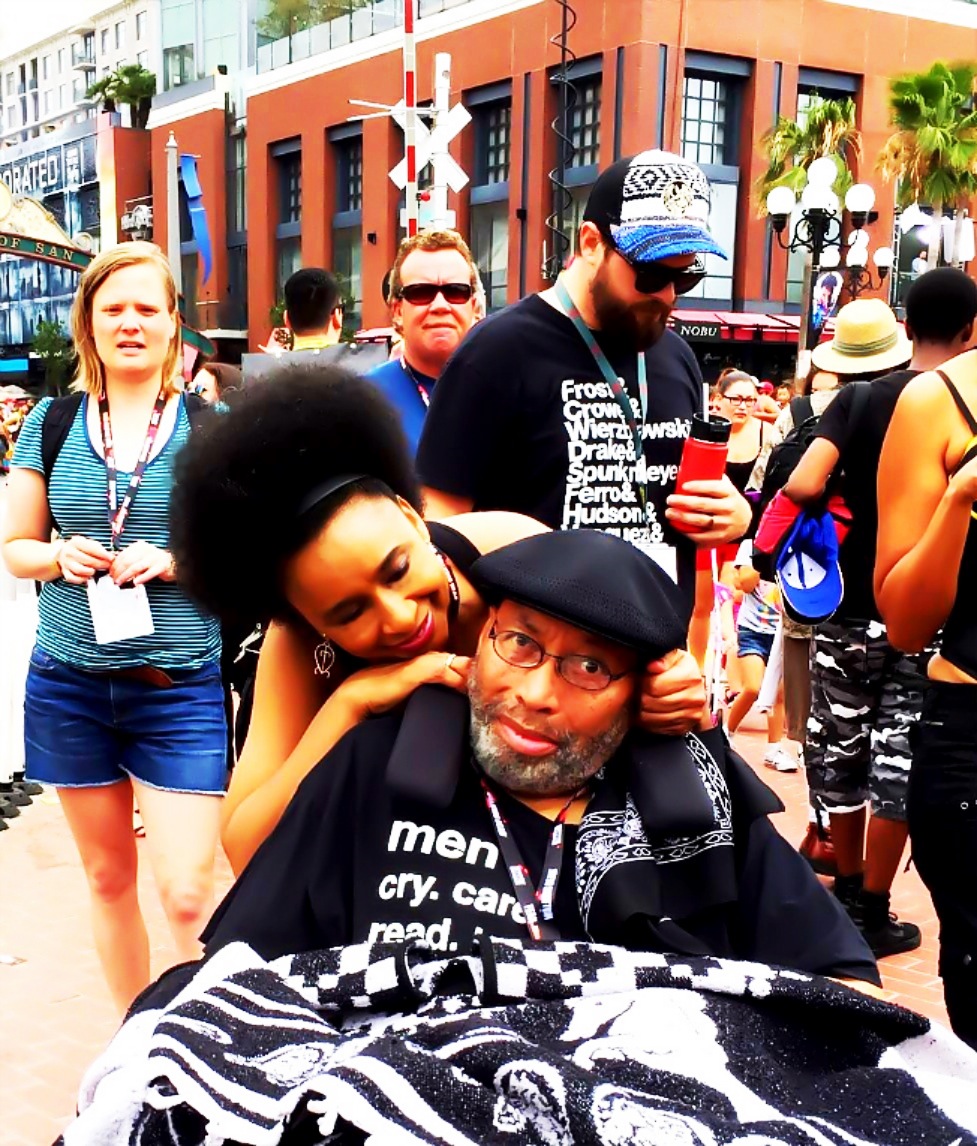By Shoshana Walter
Jack Vaile was about to turn 18 years old. He liked painting, “American Ninja Warrior,” growing his beard. He liked his pierced ears. He liked to sleep late. Like most teenagers, he didn’t think much about politics.

Jack Vaile shows the government class presentation he made to explain why he was supporting Bernie Sanders for president.Credit: Courtesy of Lou Vaile
That changed when his high school government teacher in Oakland, California, gave his class an assignment: research the presidential candidates and decide whom you want to support. After a brief curiosity about Chris Christie, Vaile threw his full support behind Bernie Sanders. He looked forward to his birthday in January, when he registered to vote. He bought a Bernie sticker, Bernie buttons and two Bernie figurines, attended volunteer meetings, campaigned at a Bernie rally and told anyone who would listen – including his doctor – who should get their vote.
But something soon dampened Vaile’s enthusiasm. His father, Lou Vaile, received a document in the mail showing that a judge had rescinded Jack’s voting rights. Lou Vaile’s heart sank. His son was no longer eligible to vote – not for Bernie, not for anybody.
“He was so excited for this election,” Lou Vaile recalled thinking. “This can’t be right.”
***
Jack Vaile is like many teenagers, and in other ways he is not. Born with a severe form of cerebral palsy, he is unable to walk or speak. He requires help urinating and showering. He moves around in an electric wheelchair he controls with his fingers, and communicates by grunting, groaning, blinking and tapping words on an iPad app.

Jack Vaile smiles with his dad, Lou Vaile, last week at their Oakland, California, home.Credit: Andrew Burton for Reveal
All his life, his father took care of him, fed him, clothed him, managed his money and his medical care. So when Jack turned 18, his parents asked a court to appoint them legal guardians, so they could continue his care into adulthood.
This request, it turns out, is what imperiled Jack Vaile’s voting rights.
Across the country, thousands of people with appointed guardians routinely lose the right to vote. More than 7,300 lost the right to vote due to “mental incompetence” between 2012 and 2014 alone, according to federal survey data collected from 33 states by the Election Assistance Commision.
Ten states automatically ban anyone declared mentally incompetent from voting. Among them is Missouri, which restricted more voters than any other state, rescinding the rights of close to 2,000 people for mental incompetence in those election years.
Those who support such laws say they prevent voter manipulation and fraud. But advocates say they are built on flawed assumptions about the abilities of disabled people, dating back centuries. By the late 19th century, most states barred people who were “idiots, insane, of unsound mind, or under guardianship” from voting. In some states, those laws are still on the books.
In California, thousands of disabled voters have lost their voting rights. The state banned more than 700 between 2012 and 2014 alone. Under previous state law, courts forbid anyone incapable of filling out a voter registration form from voting. Disqualifications were almost a matter of routine.
After attorney Tom Coleman filed a civil rights complaint, and the Department of Justice opened an investigation into the state’s practices, lawmakers passed a new California law. The state now requires conservatees to simply express a desire to vote to retain their rights. It took effect in January.
But advocates fear that many who’ve already lost their right to vote may still be unable to participate in the election next week. To get their rights restored, they have to notify the court, and many are unaware of the new law.
Some courts have made an effort to notify them. In the past year, Shasta County has seen an influx of reinstated voters from the courts, said Registrar Cathy Darling Allen. When a young woman called in tears because she couldn’t vote, Allen said she notified the court and got the woman’s rights restored.
“I feel strongly these are folks who are marginalized in so many areas of their life,” Allen said. “If they express an interest and they really do have strong feelings they should have their voice heard like anybody else.”
But not every court and registrar has been responsive, and efforts to enlist the state in notifying potential voters failed. California does not even track conservatees who have lost the right to vote, despite a state law requiring courts to send the secretary of state that information.
“What I wanted to see happen was the courts just notify people,” Coleman said. “This new law is in effect, and if you want your voting right restored, just say the magic words: ‘I want to vote.’ They don’t want to send the letters out.”
Most of those who’ve already lost their rights now face an uphill battle to regain them.
In Oakland, Lou Vaile could not bear to tell his son he couldn’t vote in his first presidential election. Using his iPad app, Jack Vaile had been telling everyone to “Vote for Bernie.” He proudly displayed his Bernie sticker on the back of his wheelchair, alongside a “Pie Till I Die” sticker – of a skeleton eating pizza.
“I felt guilty: What have I done to him, you know?” Lou Vaile recalled in a recent interview at his home with Reveal from The Center for Investigative Reporting. “It was just the most heart-wrenching, sickening feeling to realize that this right had been taken away from him based on assumptions about his ability to understand, and those assumptions were wrong.”
Lou Vaile let his son fill out his primary vote-by-mail ballot anyway, knowing it wouldn’t count. Then, as the general election neared, he realized that wasn’t fair; he needed to do something.
He called around and found an attorney at Disability Rights California with cerebral palsy. On their drive to meet Fred Nisen, Lou Vaile told his son the truth.
“The look on his face was really devastating,” Lou Vaile recalled. “He felt hurt.”
In his son’s words? “Anxious,” he tapped. “Angry.”

David Rector (center) and his fiancée, Roz Alexander-Kasparik, are surrounded by supporters and news media in August outside the San Diego Superior Court, where Rector expressed his desire to vote to a judge.Credit: Courtesy of Roz Alexander-Kasparik
In Southern California, another conservatee was fighting for the right to vote. Former National Public Radio producer David Rector lost his voting rights in 2011 after suffering a traumatic brain injury that left him unable to walk or speak. His fiancée, Roz Alexander-Kasparik, became his conservator, and said she did not question when their attorney checked a box on a form that ultimately disqualified Rector from voting in San Diego.
It was only after they met congressman and civil and voting rights activist Rep. John Lewis, D-Georgia, that Alexander-Kasparik was inspired to fight for Rector’s voting rights. She contacted an attorney and learned about the new California law.
The key section was this: Judges are still able to take away voting rights if the court finds “clear and convincing evidence that the individual cannot communicate, with or without reasonable accommodations, a desire to participate in the voting process.”
On its face, it seemed that all Rector had to do was express a desire to vote, and the court would rule him competent. Alexander-Kasparik did not expect it would be so easy, and she was right.
In August, she led a march to the San Diego Superior Court, pushing Rector seven blocks in a wheelchair, surrounded by supporters and reporters. Rector wore a white T-shirt that read “I want to vote” in black letters. He used an eye-tracking device to speak to the judge in court.
“I, David Rector, want my voting rights restored immediately,” Alexander-Kasparik recalled he said, in the device’s electronic voice. But Judge Julia Kelety was skeptical. She told Alexander-Kasparik to submit more evidence.

Former National Public Radio producer David Rector is embraced in July by his fiancée, Roz Alexander-Kasparik, who became Rector’s conservator in 2011 after he suffered a traumatic brain injury that left him unable to walk or speak.Credit: Courtesy of Roz Alexander-Kasparik
“It was painful to hear that she didn’t believe David,” Alexander-Kasparik told Reveal. As a journalist, Rector had covered countless elections. “He articulated to me I don’t know how many times that voting is the only voice we have as individuals.”
Alexander-Kasparik submitted a declaration to the court detailing every step she and Rector had made. She spends every day with Rector, she wrote, allowing her to see that he can read, think and analyze. She detailed the requirements of the new law. Two weeks later, the judge restored his rights.
Kelety doubted Rector’s cognitive abilities, she said in her order, but under the new law, she didn’t have the evidence to support her doubts nor the resources to investigate.
Alexander-Kasparik said she and Rector were relieved. But she likened the obstacles disabled voters face to a struggle for civil rights.
“The right to vote is essential,” she said. “The right to vote is not something that should be taken away on a form as a matter of routine, by judges who literally have the power over civic rights or death.”
The process for Jack was quicker than for Rector, but he still had to overcome one hurdle: convincing his attorney.
Nisen contacted Jack Vaile’s public defender. The attorney agreed to meet the Vailes in their bungalow home, and he peppered Jack with yes and no questions about voting, whom he’d choose and why, his father recalled. Finally, the attorney petitioned the court to restore Jack’s voting rights.
On Sept. 30, a new document showed up in the mail, signed by a judge. It was the legalese version of a validation: “The court finds that conservatee Jackson L.H. Vaile is capable of communicating a desire to participate in the voting process,” the order said. “The previous disqualification from voting is set aside.”
“Dude, you’re totally clear to vote in the general election,” Lou Vaile told his son. Jack broke into a toothy smile. “That was a big, big, happy day for us,” the father remembered.

One way that Jack Vaile communicates is tapping words on an iPad app.Credit: Andrew Burton for Reveal
There was just one problem: Jack Vaile couldn’t vote for Sanders anymore. The primary was long over.
Lou Vaile went through the candidates. Did Jack want to vote for Donald Trump?
“No,” Jack Vaile tapped.
Instead, on Oct. 11, he cast an early vote by mail for Hillary Clinton. She wasn’t Sanders. But for disabled people like him, Jack Vaile decided, she was better than Trump.
Rector plans to vote next week. True to his journalism training, he declined to divulge his choice.
- Originally appeared at revealnews.org

